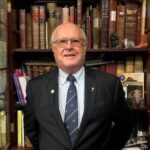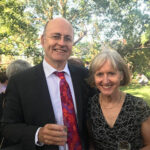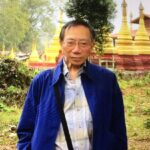
Donor Stories

Ian Armstrong OAM (OTG 1960)
‘And what better legacy could you leave than supporting education opportunities at Trinity?’
When Tunga Society member Ian Armstrong OAM (OTG 1960) first commenced at Trinity in Year 1 in 1949, it was what he describes as a ‘small school’.
‘The front of the Junior School was made of two levels for school’s jubilee in 1952 and our class was the first occupant under Miss Bell,’ he said.
Now, at almost 80 years old, Ian spends his time valuing the nation’s collection of history and technology for State and National museums as a Commonwealth Approved Valuer for cultural gifts and accounting audits.
‘Trinity gave me the grounding and the pathways, but you never stop learning,’ he said.
Ian has enjoyed a robust career in history and antiquities around the world, and through his work has been made a Knight of the Order of St Michael the Archangel (a Russian Imperial Order) and a Commander of the Order of St Lazarus of Jerusalem – both of which have a focus on giving back.
Honoured with the E W Cole award of ‘Australia’s Greatest Collector’, Ian has spent many years conserving a vast historical collection and sharing it with schools including Trinity Grammar School, Kew and Melbourne Girls Grammar.
Ian’s pieces are often on display in the Rick and Elizabeth Tudor Centre for Contemporary Learning for students to learn from and enjoy.
Ian joined the Tunga Society to ‘give back’ to others what Trinity provided for him.
‘Being a Trinity Grammarian is a privilege! The world is at your feet,’ he said.
‘And what better legacy could you leave than supporting education opportunities at Trinity?’

Professor Don Campbell (OTG 1972)
When I received my scholarship, I was eleven years old, and it was the beginning of Form 1 for me, now called Year 7. I had started at the school the previous year. My father was a believer in education and was convinced that Trinity was the right school for his two boys. He never expressed an opinion about the right school for his daughter, and as he is no longer around, it will be hard to ask him now.
My brother started in the St Paul’s Cathedral Choir the following year. In those days a Choir Scholarship was a full scholarship while you were singing and a half scholarship when you finished. You didn’t have to be Einstein to work out that our family income would not support two boys on full fees attending Trinity, so I thought: what can I do about it? I had a morning paper round in Grade 5 and 6, which I was allowed to do, so long as my income went into my education fund. From the one pound thirteen shillings ($3.30) I earned, I was allowed to keep one and six (15 cents) each week.
This allowed me to get a milkshake and a Weston’s Wagon Wheel each Saturday morning, until decimal currency came in and the milkbar owner put the price of a milkshake up to 12 cents, so that the 12 pence wouldn’t be rounded down to ten cents. I refused to buy a Weston’s Wagon Wheel when he did that. By the end of 1965, I had saved 75 pounds, which was the fee for a term at Trinity. One down and two terms to go for the year, but what after that? How would we afford for me to stay at Trinity? I decided to sit the scholarship exam.
I came out of the exam and my father asked me, ‘How was it?’
I told him, ‘I’ve got one, but I don’t know if I will get the full one or just a half.’
He laughed and said, ‘You might want to wait for the results of the exam before you make that sort of announcement.’ I got one, but it was only a half. Damn.
I asked my brother what you had to do to get in the Cathedral Choir. He told me that you had to sing two hymns and God Save the Queen. So my brother taught me to sing God Save the Queen in our shared bedroom, along with For all the Saints (Hymn 202 from memory in A&M) and To be a Pilgrim. I asked him when I would be good enough to pass the test, and he told me. So I went and did the test. I was pleased when I passed because it meant we would be able to afford for me to go to Trinity, and, when my voice broke I would have the half scholarship from being in the Cathedral Choir and the academic half scholarship. I was annoyed because it meant I would probably end up not playing footy or cricket as much. Choir meant practice in the cathedral five days a week and services Sunday morning and evening, and I knew I would miss out on training. I figured that was a price worth paying, but resented it nonetheless. I resented the pressure put on me to sing in the school choir as well, but that passed.
I benefited from being in the Cathedral Choir because it gave both my brother and I the opportunity to excel at something in a team environment, where I at least was only a very mediocre talent at best. I can also credit my brother with bringing an end to initiation in the choir, fortunately before my arrival. Being in the Cathedral Choir gave me the pleasure of a love of English choral music. In terms of my academic scholarship, there didn’t seem to be any expectations put on me. No one knew and no one cared, which I am extremely grateful for. I wouldn’t have wanted anyone to know about it. I would have been extremely embarrassed, as I think kids want to fit in more than anything.
I am telling you about this because it seems an appropriate time to point out to the Trinity community that there are many benefits from having a scholarship program, and that those benefits can have long lasting and profound effects. When Rick Tudor and Rohan Brown rang me and invited me to lunch, I said, ‘I’ve been waiting for this call for over 20 years, how much do you want?’ I am pleased to have the opportunity to support, in turn, the Indigenous Scholarship Program in a very small way. I wish I understood better what we should be doing to support Indigenous education. No matter what is done, I am sure there will be many critics of any particular approach. Connection with community is of paramount importance, of this at least, I am sure.
It has been my privilege to attend Trinity and to be a member of School Council in recent years. I wanted to give something back. I encourage you as a reader to consider what you can give to our community, be it by supporting a scholarship or more broadly supporting education in whatever form appeals to you.
Supporting our children’s education and extending that support beyond our own immediate families helps us build a better, stronger community. In the end, investment in a strong community is our best investment.

Kenneth Tse (OTG 1961)
In 2021 we received a significant gift directed to our Indigenous Scholarship Fund. The late Kenneth Tse was a member of our OTG community who had lost connection with Trinity once he left his old school. However, after reading an article in The Trinity Grammarian, he was impressed with our Indigenous program and decided to show his support in the most immediate way, by making a major gift to the Indigenous Scholarship Fund.
The power of gifts like Kenneth’s enable us to change the lives of so many boys and strengthen important education learning journeys and programs. We are grateful to all our donors for continuing to support Trinity and our students, especially in these ever-changing times.
‘I left Australia after my internship in 1969, and I have been living in Canada since 1971. A few years back, when I visited Melbourne, my cousin, Laurence Law, who is also an OTG, took me to the school for a visit. I could hardly recognise the place except for Roberts House where I boarded. Since then, I have received The Trinity Grammarian, and one issue discussed the Indigenous student scholarship. I thought that was an excellent way to provide Indigenous students a chance to advance their education and hope that they can finish a tertiary education and return home to serve their community. That is what triggered my little contribution.’
‘I was fortunate that my family sent me to Trinity, because I was an average student and I do not have a good memory. When I was taking British History, my teacher told me that remembering dates are not as important as understanding the social, economic and political conditions. After that, it opened up my mind and I was able to get past the memory part of medicine, and excelled in my profession as a specialist.’